Solar PV, solar thermoelectric and wind energy production
In the week of Dec. 25, changes in solar energy production compared to the previous week showed no clear trend in the main European electricity markets. In the German and French markets, solar energy production increased by 43% and 2.9%, respectively. The opposite trend occurred in the Southern European markets as solar energy production fell 33% in Italy and 26% in the Iberian Peninsula.
For the week of Jan. 1, according to AleaSoft Energy Forecasting’s production forecasts, solar energy will decrease in Germany, Italy and Spain.
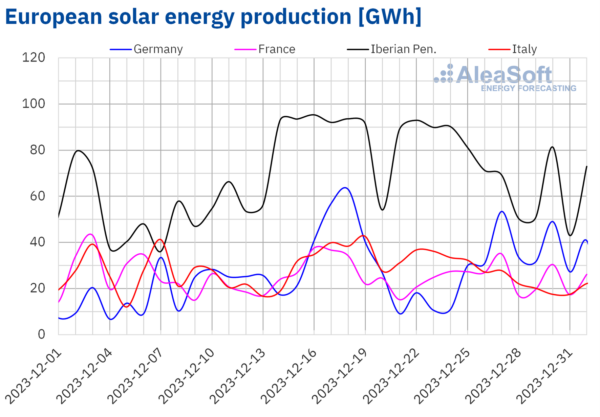
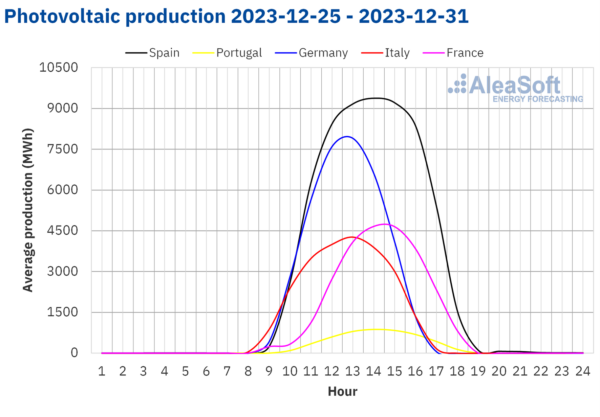
There was a weekly decline in all major European electricity markets for wind energy production in the last week of 2023. The drop ranged from 63% in Italy to 1.6% in France. Despite less overall production, the French market generated 391 GWh of wind energy on Dec. 31 – the highest daily value according to historical data.
For the week of January 1, AleaSoft Energy Forecasting’s production forecasts indicate that wind generation will increase in Spain, Portugal and Italy, and decrease in France and Germany.
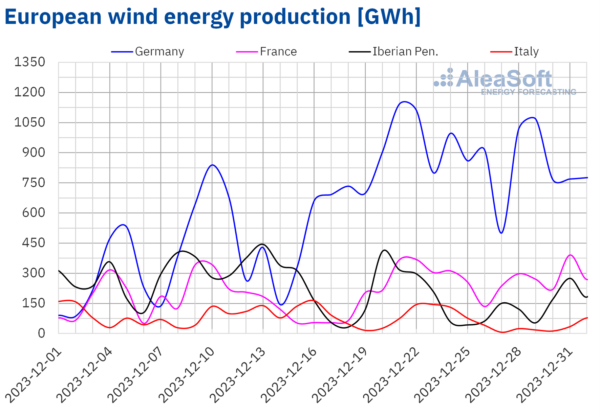
Electricity demand
In the week of Dec. 25, electricity demand decreased in all major European electricity markets compared to the previous week, which was expected due to the Christmas holidays. The Italian market registered the largest decline of 23% while the Portuguese market registered the smallest drop of 7%.
During that week, the average temperature increased in most analyzed countries ranging from 1.8 C in Germany to 0.3 C in the Netherlands. Only the Iberian Peninsula and Great Britain registered cooler conditions with a temperature decrease between 0.9 C and 2.1 C, respectively.
Electricity demand will increase in all analyzed markets for the week of Jan. 1, according to AleaSoft Energy Forecasting’s forecasts.
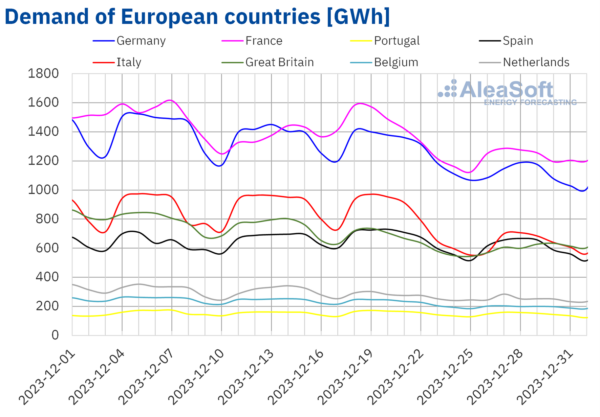
European electricity markets
In the week of Dec. 25, prices in some of the main European electricity markets fell, while in other markets prices increased compared to the previous week. In the EPEX SPOT market of the Netherlands, Belgium, France and Germany, prices fell by 32%, 44%, 47% and 50%, respectively. In the rest of the markets analyzed at AleaSoft Energy Forecasting, prices rose between 6.9% in the IPEX market of Italy and 16% in the MIBEL market of Portugal.
Popular content
In the fourth week of December, weekly averages were below €55/MWh in most analyzed European electricity markets. The exceptions were the Spanish, Portuguese and Italian markets, with averages of €76.61/MWh, €76.86/MWh and €116.17/MWh, respectively. In the rest of the analyzed markets, prices ranged from €20.69/MWh in the German market to €54.98/MWh in the N2EX market of the United Kingdom.
The German, Belgian, French and Dutch markets registered negative hourly prices on most days of the last week of December, as well as on Jan. 1. In the early morning hours of Dec. 25, the German, Belgian and Dutch markets reached their lowest prices since Aug. 8, while the French market reached its lowest price since July 16. The lowest hourly price, ‑€13.37/MWh, was in the German market. The British market also registered negative prices on Dec. 25, 28 and 29 and Jan. 1. In the case of the Spanish and Portuguese markets, there was a price of €0/MWh on Sunday, Dec. 31, from 4:00 to 6:00.
During the week of Dec. 25, the general drop in electricity demand and the increase in solar energy production in countries such as Germany and France contributed to the price decreases registered in the EPEX SPOT market. However, wind and solar energy production fell in Italy and the Iberian Peninsula. This led to higher prices in these markets.
AleaSoft Energy Forecasting’s price forecasts indicate that in the first week of January, prices might increase in most European electricity markets. The recovery in demand and the decrease in wind energy production in some markets might contribute to this behavior. However, the IPEX and MIBEL markets might register price decreases. A significant rise in wind energy production in these markets would lead to these price decreases.
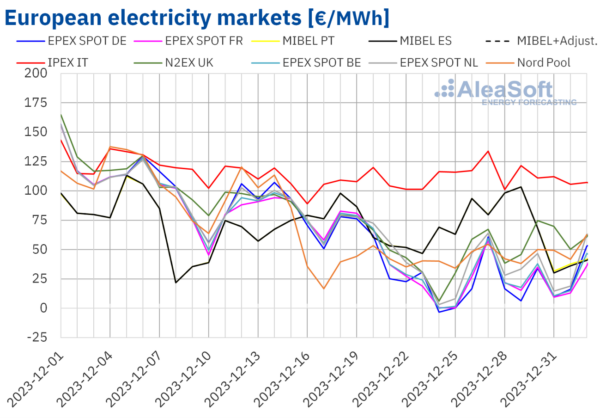
Brent, fuels and CO2
Brent oil futures for Front‑Month in the ICE market started the last week of December up $2/bbl from the price of the last session of the previous week. On Tuesday, Dec. 26, these futures registered their weekly maximum settlement price, $81.07/bbl. But for the rest of the week, prices declined. As a result, on Friday, Dec. 29, they reached their weekly minimum settlement price of $77.04/bbl.
In the last week of December, high production levels in countries such as the United States, Brazil or Guyana and concerns about the evolution of demand continued to exert their downward influence on Brent oil futures prices. The announcement by some companies of their intention to resume shipping through the Red Sea also contributed to the decline in prices in the last sessions of the week.
As for TTF gas futures in the ICE market for the Front‑Month, on Wednesday, Dec. 27, they reached the weekly maximum settlement price, €35.51/MWh. But on Thursday the price fell by 6.8%. After falling another 2.3%, these futures registered their weekly minimum settlement price, €32.35/MWh, on Friday, Dec. 29. According to data analyzed at AleaSoft Energy Forecasting, this price was the lowest since the first week of September.
In the last week of December, the high levels of European reserves, forecasts of mild temperatures in Northwestern Europe and uncertainty about the evolution of industrial demand led to settlement prices of TTF gas futures remaining below €40/MWh.
As for settlement prices of CO2 emission rights futures in the EEX market for the reference contract of December 2023, during the last week of December, they continued the upward trend of the previous week. As a result, on Friday, Dec. 29, they reached their weekly maximum settlement price, €80.37/t. This price was the highest since the second half of October.
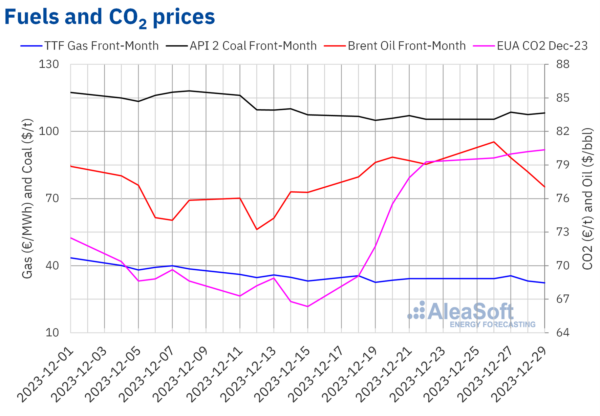
The views and opinions expressed in this article are the author’s own, and do not necessarily reflect those held by pv magazine.
This content is protected by copyright and may not be reused. If you want to cooperate with us and would like to reuse some of our content, please contact: editors@pv-magazine.com.
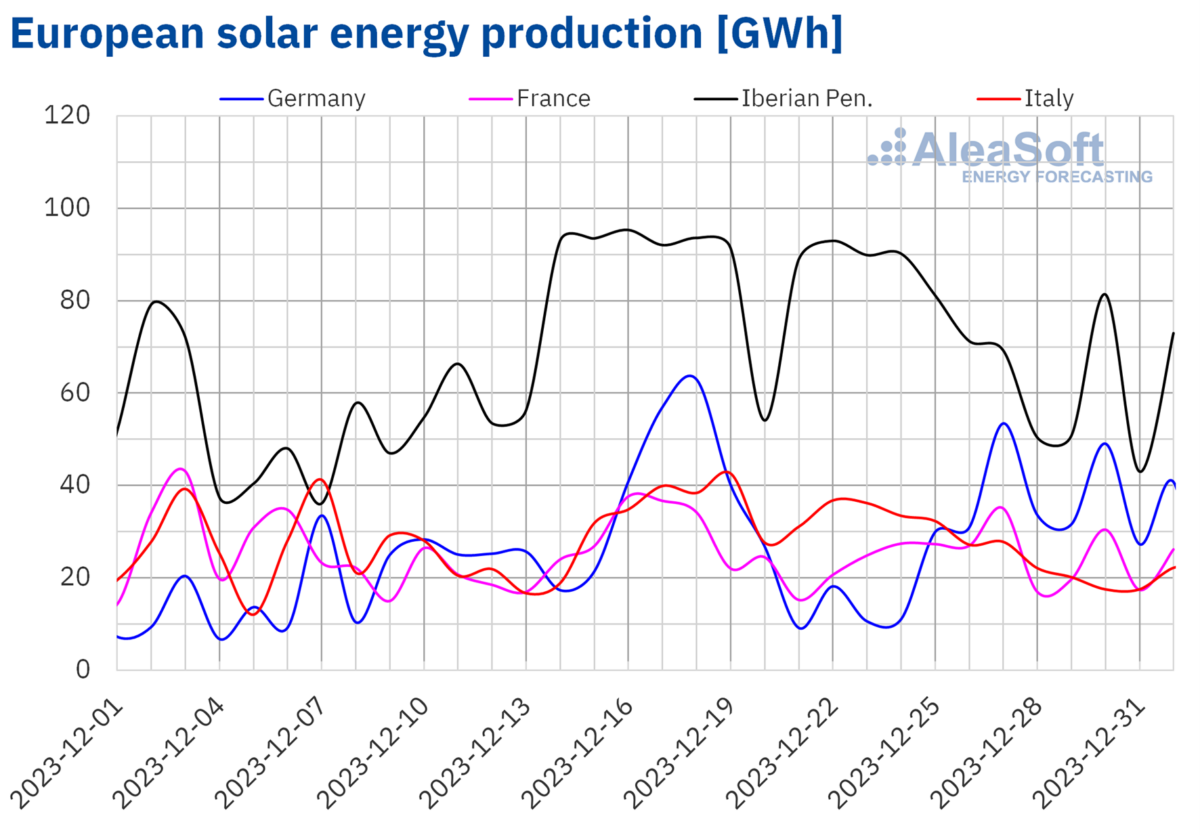

By submitting this form you agree to pv magazine using your data for the purposes of publishing your comment.
Your personal data will only be disclosed or otherwise transmitted to third parties for the purposes of spam filtering or if this is necessary for technical maintenance of the website. Any other transfer to third parties will not take place unless this is justified on the basis of applicable data protection regulations or if pv magazine is legally obliged to do so.
You may revoke this consent at any time with effect for the future, in which case your personal data will be deleted immediately. Otherwise, your data will be deleted if pv magazine has processed your request or the purpose of data storage is fulfilled.
Further information on data privacy can be found in our Data Protection Policy.